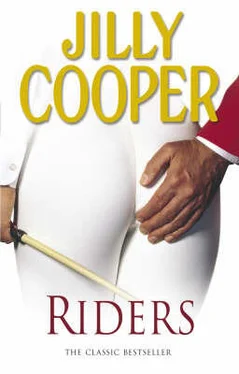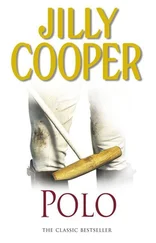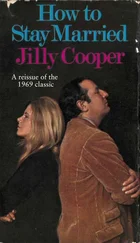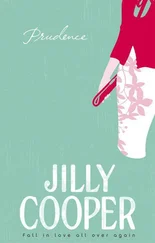Jilly Cooper - Riders
Здесь есть возможность читать онлайн «Jilly Cooper - Riders» весь текст электронной книги совершенно бесплатно (целиком полную версию без сокращений). В некоторых случаях можно слушать аудио, скачать через торрент в формате fb2 и присутствует краткое содержание. ISBN: , Жанр: Современные любовные романы, на английском языке. Описание произведения, (предисловие) а так же отзывы посетителей доступны на портале библиотеки ЛибКат.
- Название:Riders
- Автор:
- Жанр:
- Год:неизвестен
- ISBN:978-1-41656536-9
- Рейтинг книги:3 / 5. Голосов: 1
-
Избранное:Добавить в избранное
- Отзывы:
-
Ваша оценка:
- 60
- 1
- 2
- 3
- 4
- 5
Riders: краткое содержание, описание и аннотация
Предлагаем к чтению аннотацию, описание, краткое содержание или предисловие (зависит от того, что написал сам автор книги «Riders»). Если вы не нашли необходимую информацию о книге — напишите в комментариях, мы постараемся отыскать её.
Riders — читать онлайн бесплатно полную книгу (весь текст) целиком
Ниже представлен текст книги, разбитый по страницам. Система сохранения места последней прочитанной страницы, позволяет с удобством читать онлайн бесплатно книгу «Riders», без необходимости каждый раз заново искать на чём Вы остановились. Поставьте закладку, и сможете в любой момент перейти на страницу, на которой закончили чтение.
Интервал:
Закладка:
Discussing ambition in life, Harold had lightly quoted: “ ‘I am he that aspired to know, and thou?’ ” To which Helen had instantly, almost despairingly, quoted back: “ ‘I would love infinitely, and be loved!’ ”
Harold Mountjoy realized he was on to a good thing and asked her for a drink. Secret meetings followed; self-conscious letters weighed down by literary allusions were exchanged, and finally Helen’s virginity was lost in a motel twenty-five miles from the campus, followed by fearful guilt, followed by more motels and more guilt. Under Harold’s radical guidance, Helen embraced radical causes and on vacation shocked her parents even more.
Finally, towards the end of the summer term, Helen fainted in class. Her roommate, who, despite Helen’s attempts at secrecy, had regularly been reading her diary, went to the head of the faculty. He, in turn, was highly delighted, because for years he had been looking for an excuse to dump Harold Mountjoy, whom he regarded as not only immoral but, far worse, intellectually suspect. Helen’s parents were summoned. Appalled, they removed her from college. Her father, being a dentist, had the medical contacts to organize a discreet abortion. Helen and Harold were forbidden to see one another again. Harold, clinging to his job, terrified his wife would find out, complied with the request. This was the last straw for Helen. Losing her virginity had meant total commitment. She had expected Harold to tell her to keep the baby and to divorce his wife.
Desperately worried about her, her parents, who were kindly if rigid people, packed her off to England in the hope that this other great imagined love of her life would distract her. She was to stay for at least a year. Helen rang Harold Mountjoy in despair. He urged her to go. They would both write. In time they would meet again. There was a possibility he’d get over to England in August. At last Helen agreed.
The head of the faculty wrote to his London publishers, giving Helen an excellent reference and praising her diligence, and they agreed to give her a job, reading manuscripts, writing blurbs, and copyediting. He also fixed her up with digs with a female author in Hampstead.
So Helen pieced her broken heart together and came to England in October, unable to suppress a feeling of excitement that she would soon be able to visit St. Paul’s, where John Donne had preached, and Wimpole Street, where Robert Browning had courted Elizabeth Barrett. She might even get up to the Lakes to see Wordsworth’s cottage, or Haworth, home of the Brontës.
Sadly, England proved a disappointment. Accustomed to year-round Florida sunshine, Helen arrived at the beginning of the worst winter for years. She couldn’t believe how cold it was.
By day she froze in her publishing house, by night she froze at her digs, which were awful. The female author was an ancient lesbian who watched her every move. Upstairs was a lecherous lodger who made eyes at her at mealtimes and kept coming into her room on trumped-up excuses. The place was filthy and reeked of a tomcat, which her landlady refused to castrate. The landlady also used the same dishcloth to wash up the cat’s plates and the humans’ plates. The food was awful; they seemed to eat carbohydrates with carbohydrates in England. She found herself eating cookies and candy to keep out the cold, put on ten pounds, and panicked.
At the weekends she froze on sightseeing tours, shivering at Stratford, at the Tower, and on the train down to Hampton Court, and in numerous art galleries.
The English men were a bitter disappointment, too. None of them looked like Darcy, or Rochester, or Heathcliff, or Burgo Fitzgerald, or Sebastian Flyte. None of them washed their hair often enough; she never dared look in their ears in the subway. They also seemed de-sexed by the cold weather. They never gazed or whistled at her in the street. Anyway, Helen was not the sort of girl who would have picked up men. As the days passed, she grew more and more lonely.
Harold Mountjoy was another disappointment. After one letter: “Darling girl, forgive a scribbled note, but you are too precious to have brief letters. It would take a month to tell you all I feel about you, and I don’t have the time,” he didn’t write at Christmas or remember her birthday or even Valentine’s Day.
Finally, at the beginning of March, Helen decided she could bear her digs no longer. On the same day that her landlady used a cat-food-encrusted spoon to stir the beef stew with, and the tomcat invaded her room for the hundredth time and sprayed on her typewriter cover, she moved into Regina House, an all-female hostel in Hammersmith, which catered exclusively for visiting academics, and was at least clean and warm.
Nor was her job in publishing very exciting. The initial bliss of being paid to read all day soon palled because of the almost universal awfulness of the manuscripts submitted. To begin with, Helen wrote the authors polite letters of rejection, whereupon they all wrote back, sending her other unpublished works and pestering her to publish them; so finally she resorted, like everyone else, to rejection slips.
Her two bosses took very extended lunch hours and spent long weekends at their houses in the country. One of the director’s sons, having ignored her in the office, asked her out to dinner one evening and lunged so ferociously in the car going home that Helen was forced to slap his face. From then on he went back to ignoring her.
The only other unmarried man in the office was a science graduate in his late twenties named Nigel, a vegetarian with brushed-forward fawn hair, a straggly beard, a thin neck like a goose, and spectacles. For six months, Helen and he had been stepping round each other, she out of loneliness, and he out of desire. They had long political arguments and grumbled about their capitalist bosses. Nigel introduced her to Orwell and bombarded her with leftist literature.
He was also heavily involved with the anti-fox hunting movement and seemed to spend an exciting resistance life on weekends rescuing foxes and hares from ravening packs of hounds, harassing hunt balls with tear gas, and descending by helicopter into the middle of coursing meetings. He was constantly on the telephone to various cronies named Paul and Dave, arranging dead-of-night rendezvous to unblock earths. Often he came in on Monday with a black eye or bandaged wrist, after scuffles with hunt supporters.
One Friday, towards the end of March, he asked Helen out to lunch. He was wearing a yellow corduroy coat, a black shirt, had clean hair, and looked less unattractive than usual. Inevitably, the conversation got around to blood sports.
“They think we’re all lefties or students on the dole living in towns,” he said, whipping off his spectacles. “But we come from all walks of life. You see, the fox,” he went on in his flat Northern accent, “beautiful, dirty, hard-pressed with so many people after him, hounds, foot-followers, riders, horses, terriers, he needs us on his side to tip the balance a little.”
Helen’s huge eyes filled with tears. For a moment, in his blaze of conviction, Nigel reminded her of Harold Mountjoy. He speared a piece of stuffed eggplant with his fork. “Why don’t you come out with us tomorrow? We’re driving down to Gloucestershire to rot up the Chalford and Bisley. It’s the last meet of the season. Dave’s got hold of a lot of fireworks; it should be a good day.”
Helen, unable to face another weekend on her own, trailing round galleries or visiting the house of some long-dead writer, said she’d love to.
“And afterwards, we might have dinner in Oxford,” said Nigel. “They’ve opened a good vegetarian restaurant in the High.”
And now she was rattling down the M4 to Gloucestershire and wondering why the hell she’d agreed to come. The dilapidated car was driven by a bearded young zoology graduate named Paul, who had cotton wool in his ears and was already losing his hair. Beside him sat Nigel. Both men were wearing gum boots and khaki combat kit, and khaki, she decided, simply wasn’t Nigel’s color.
Читать дальшеИнтервал:
Закладка:
Похожие книги на «Riders»
Представляем Вашему вниманию похожие книги на «Riders» списком для выбора. Мы отобрали схожую по названию и смыслу литературу в надежде предоставить читателям больше вариантов отыскать новые, интересные, ещё непрочитанные произведения.
Обсуждение, отзывы о книге «Riders» и просто собственные мнения читателей. Оставьте ваши комментарии, напишите, что Вы думаете о произведении, его смысле или главных героях. Укажите что конкретно понравилось, а что нет, и почему Вы так считаете.












